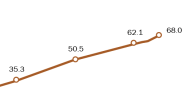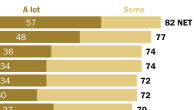Amid heightened deportation efforts during Donald Trump’s second term, about half of U.S. Latinos worry they or someone close to them might be deported, up from earlier in the year. A majority also say immigration arrests or raids have occurred in their local area in the past six months.
Latinos are more likely than other U.S. adults to say they:
- Worry they or someone close to them might be deported
- Are aware of immigration arrests occurring in their local community in recent months
- Worry about being asked to prove their legal status in the country during their daily activities
- Have changed their daily routines in recent months because they think they will be asked to prove their status in the country
These findings come from Pew Research Center’s National Survey of Latinos, a nationally representative, bilingual survey including 4,923 U.S. Latino adults, conducted Oct. 6-16, 2025.
Pew Research Center estimates that in 2023, the vast majority of U.S. Latino adults (82%) had full legal status as U.S.-born citizens (54%), immigrants with naturalized citizenship (15%) or lawful immigrants without citizenship (13%). Additionally, 18% were unauthorized immigrants, a group that includes those without full legal status.13
This is the last of six detailed sections in a report on Latinos’ views of Trump’s second administration and their situation in the country. For Latinos’ views of immigration policy, visit Chapter 5. For a summary of the report’s findings, visit the overview.
Latinos are increasingly worried about deportations
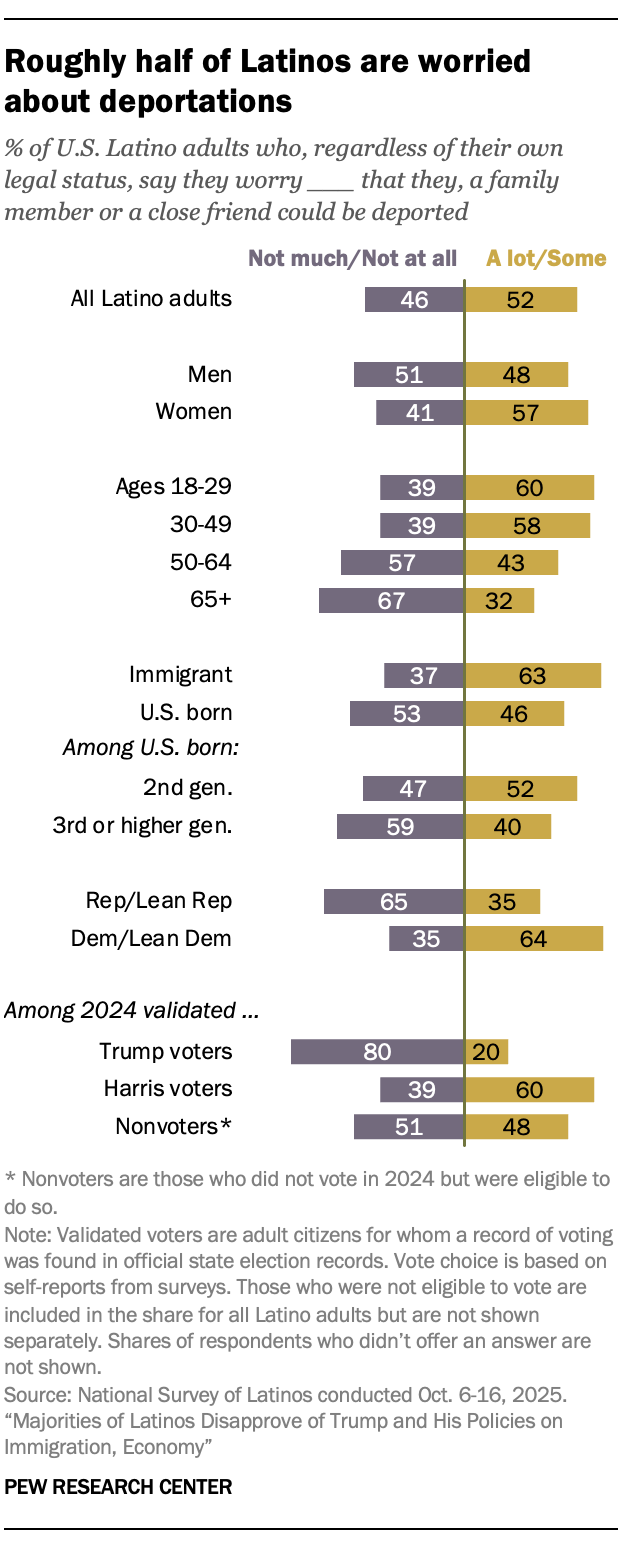
More Latinos now worry that they, a family member or a close friend might be deported compared with earlier this year.
About half of Latinos (52%) now express this concern, higher than the 42% who said the same in March. The current share is also higher than concern levels reported in 2021, when 39% were worried during the Biden administration, and in 2019 when 44% were worried during Trump’s first term.
Who is worried about deportations?
A majority of Latinos with family origins in Central America and Mexico worry they or someone close to them might be deported. About half of Latinos with family origins in South America and Cuba say the same.
And while Puerto Ricans are all U.S.-born citizens, roughly one-in-three say they worry about deportations.
Differences in concern also emerge across other groups of Latinos:
- 64% of Democrats and Democratic-leaning independents worry about deportation, while 35% of Republicans and Republican leaners say the same.
- 63% of immigrants worry they or someone close to them might be deported, compared with 46% of the U.S. born.
- 60% of adults under 30 worry they or someone close to them might be deported, nearly double the share of those ages 65 and older (32%) who say the same.
About 1 in 5 Hispanics personally know someone who’s been recently deported or detained
Some 22% of Hispanics personally know someone who’s been deported or detained by the U.S. federal government for immigration reasons in the last year.
About a third of Central Americans know someone who’s been recently deported or detained, higher than the shares among Mexicans (22%), South Americans (21%), Cubans (18%) and Puerto Ricans (15%).
Latinos’ recent experience with ICE activity in their local communities
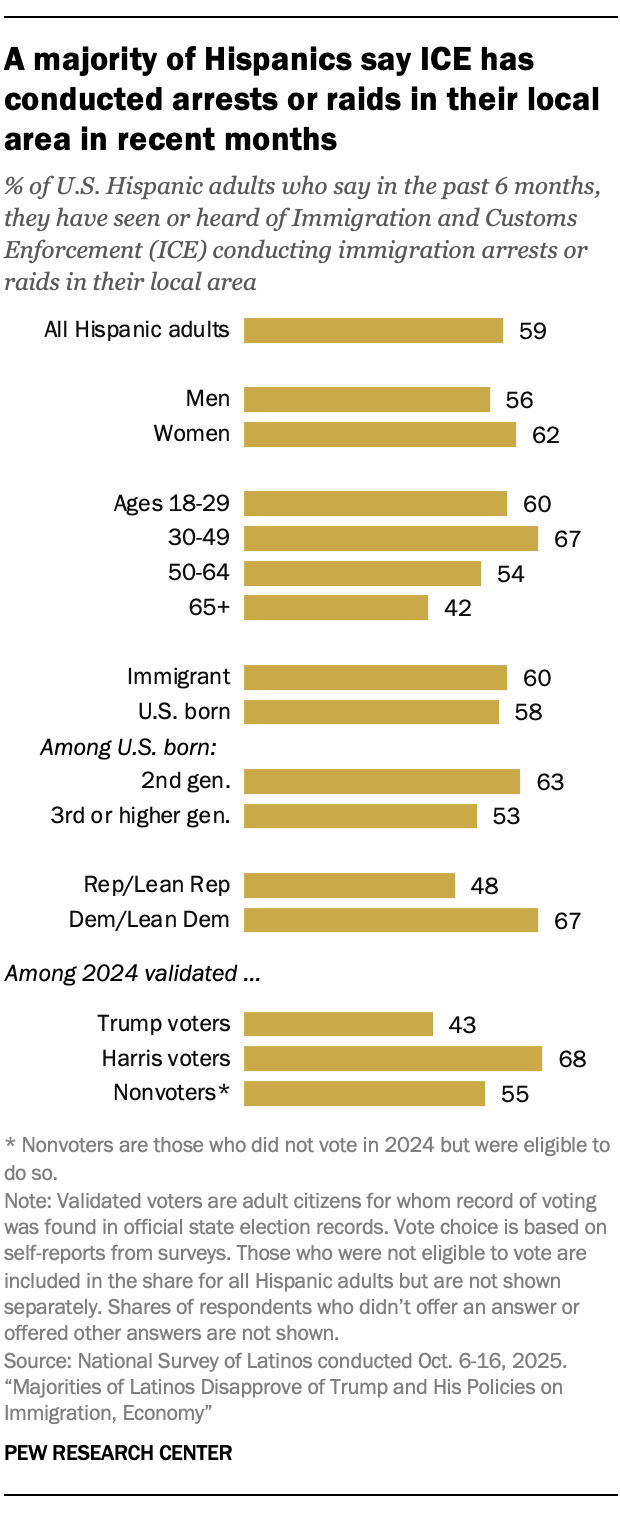
Amid increased immigration arrests conducted by Immigration and Customs Enforcement (ICE) this year, 59% of Latinos say they have seen or heard of ICE arrests or raids in their local area in recent months.
Who has seen or heard of ICE arrests or raids in their local area?
Similar shares of Latino immigrants and U.S.-born Latinos say there’s recently been ICE enforcement activity in their local area (60% and 58%, respectively).
But differences emerge across other groups of Latinos:
- 67% of Democrats say ICE has recently conducted immigration arrests or raids in their area, compared with 48% of Republicans.
- Among the U.S. born, 63% who are second generation – those with at least one immigrant parent – say there’s been ICE enforcement activity in their area, higher than the 53% share among the third or higher generation (those with both U.S.-born parents).
- 60% of adults under 30 say there’s been ICE enforcement activity in their community, while fewer than half who are 65 and older say the same (42%).
And roughly two-in-three Central Americans and Mexicans (64%) say ICE has conducted arrests or raids in their local area, compared with about half of Puerto Ricans (51%), South Americans (51%) and Cubans (47%).
Many Latinos say immigration enforcement makes them feel less safe
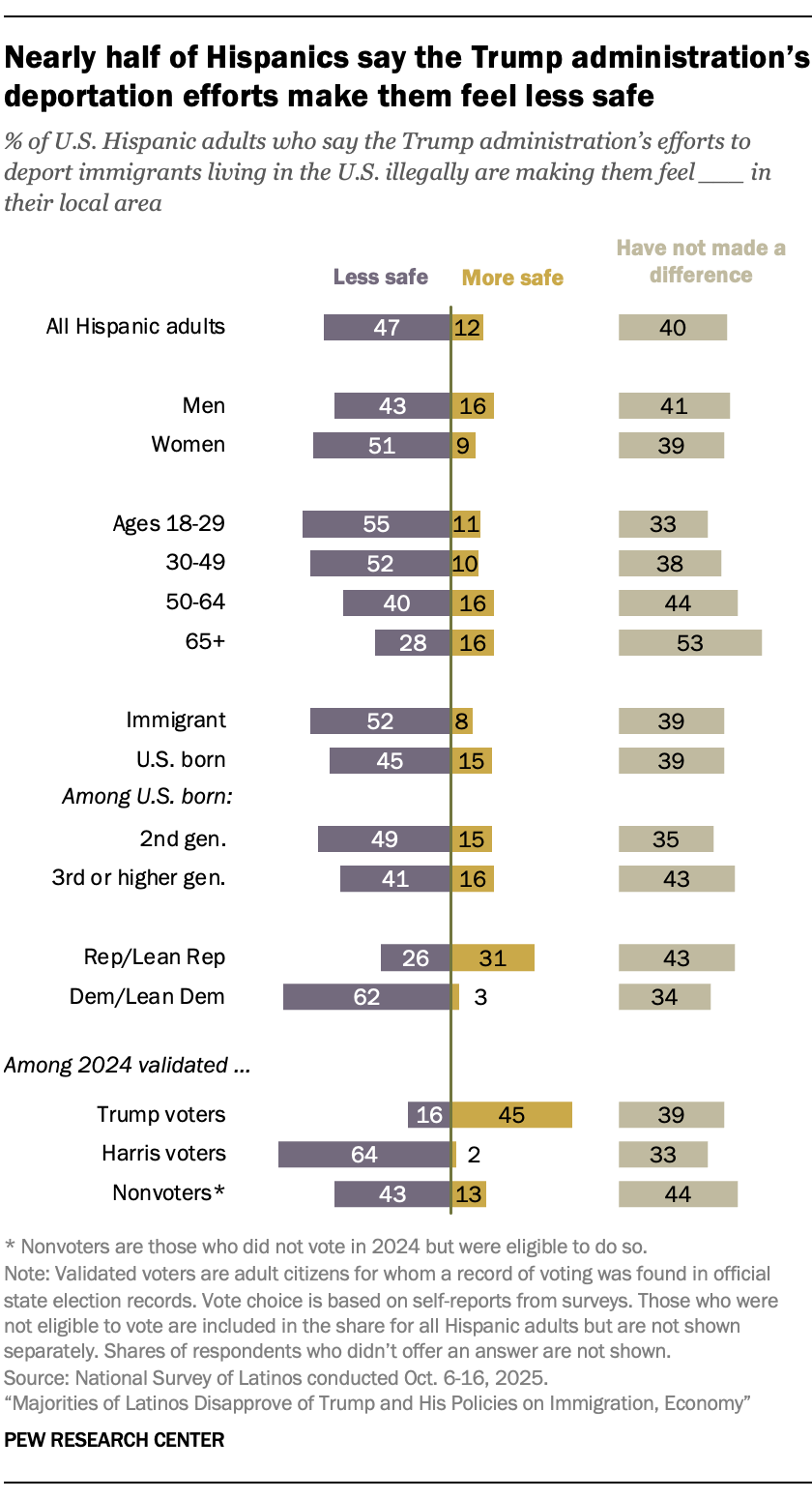
The Trump administration’s deportation efforts have impacted how safe many Latinos feel in their own community.
Nearly half (47%) feel less safe in their local area because of the administration’s deportation actions, while 12% feel safer. A significant share (40%) says the administration’s efforts haven’t made a difference either way.
Whose sense of safety has been affected by immigration enforcement?
How Latinos see the impact of the administration’s deportation efforts on their safety varies across demographic groups.
- 62% of Democrats say they feel less safe in their local area, versus 26% of Republicans.
- 52% of immigrants say they feel less safe, versus 45% of those born in the U.S.
- 55% of adults under 30 say they feel less safe, versus 28% of those 65 and older.
About half of Mexicans and Central Americans say the administration’s efforts have made them feel less safe in their local areas, compared with about four-in-ten or fewer among other origin groups.
Additionally, those who have seen or heard of ICE conducting arrests or raids in their local community are much more likely than those who have not to say the administration’s efforts are making their area feel less safe (58% vs. 32%).
Are Latinos worried about having to prove their legal status, and has it led them to change their daily routines?
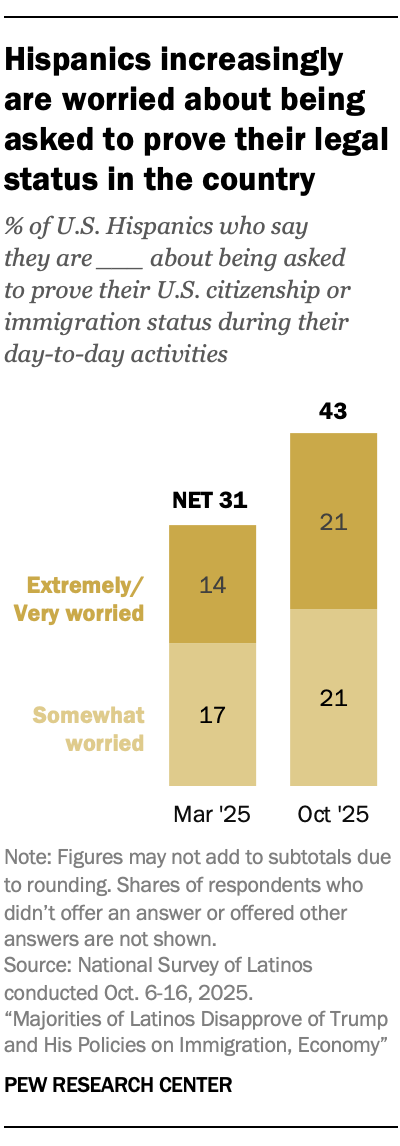
Latinos express more concern about being asked to prove their U.S. citizenship or immigration status in the country now than earlier in the year. In the October survey, 43% say they are at least somewhat worried about being asked to prove their U.S. citizenship or immigration status during their day-to-day activities, up from 31% in March.
Roughly one-in-five Hispanic adults (19%) say that in the last six months, they’ve made changes in their daily routines because they think they might be asked to prove their U.S. citizenship or immigration status. On the other hand, 81% say they have not done so.
The survey also asked about specific changes Latinos have made in their daily activities or habits because they might be questioned about their legal status. About one-in-ten say they now carry a document proving their citizenship or immigration status more often than they normally would (11%). Democrats are more likely than Republicans to say they’re doing this (17% vs. 4%).
At the same time, some Latinos are engaging in certain activities less often in recent months, such as:
- Attending local community or cultural events (10% say they do this less often than they normally would)
- Speaking a non-English language in public and attending gatherings hosted by family or friends (9% each)
- Going grocery shopping (8%)
- Attending religious services (7%)
When asked if they have been stopped by authorities and asked about their U.S. citizenship or immigration status in the last six months, 5% of Latinos say they have experienced this. Those born in the U.S. are just as likely as immigrants to say this has happened to them (6% and 4%, respectively).


